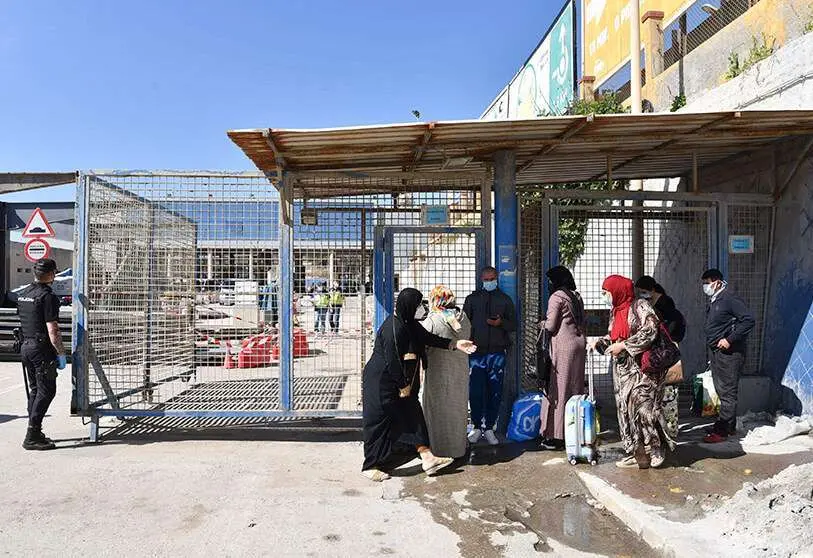Fronteras terrestres abiertas entre Marruecos y España

The land borders between Morocco and Spain through the autonomous cities of Ceuta and Melilla have been reopened as of midnight, which marks the beginning of 17 May.
Two years ago, the Alawite kingdom unilaterally decreed the closure of borders to deal with the coronavirus pandemic, as a measure of isolation and protection of the population in the midst of the health crisis that was sweeping the world; and this very midnight the El Tarajal crossing in Ceuta and Beni Enzar in Melilla have been opened, with a security and control device that will mark a "gradual and orderly" flow of transit, as announced last week by the Spanish Minister of the Interior, Fernando Grande-Marlaska.
In the first phase of the planning organised by Spain and Morocco, only European Union citizens and those with a permit to travel in Schengen territory will be able to cross the border. In both categories, in order to access Ceuta and Melilla, it will be essential to comply with the health requirements set out by the Ministry of Health and also with the European Union's ruling on the COVID-19 health crisis. In view of this situation, a special police reinforcement has been arranged, as announced by the Spanish Ministry of the Interior.

On 31 May, the second phase will come into operation, thanks to which "legally recognised" border workers will be able to enter the two autonomous cities. According to Interior Ministry sources, this is a group of around 200 people. However, a census carried out before the pandemic arrived reveals that more than 2,000 Moroccans (mostly women working in households) were employed on Spanish territory, as reported by the newspaper La Vanguardia.
This all-important step of reopening the borders comes after the normalisation of relations between Morocco and Spain following a stormy diplomatic crisis that marked a great divide between two neighbouring nations that have always considered themselves allies. The return to good relations between the two countries came thanks to the boost provided by Spain's recognition of the Moroccan formula of broad autonomy for Western Sahara under the sovereignty of the Alawite kingdom as the "most serious, credible and realistic" within the framework of UN resolutions, as announced by the Spanish government. This Spanish move was followed by a friendly gesture from Morocco's King Mohammed VI, who invited Prime Minister Pedro Sánchez to attend a meeting in Rabat in the middle of Ramadan.
This put an end to a difficult situation that opened a diplomatic rift between the two countries, especially after the Polisario Front leader Brahim Ghali was received in Spain a little over a year ago to be treated for a respiratory ailment in a hospital in Logroño. Morocco protested at this situation and criticised the Spanish government for not cooperating with the Alawi kingdom on this occasion, despite the fact that they are considered neighbours and friends. After the Ghali case, other episodes followed that made the situation more tense, such as the entry of some 10,000 illegal immigrants from Morocco through the Ceuta border with a certain degree of permissiveness on the part of the Kingdom's police, and the withdrawal of the Moroccan ambassador from Madrid.
At the most complicated moments, gestures of appeasement and rapprochement were made, such as those made by the King of Spain, Felipe VI, and the appointment of José Manuel Albares, a man with a good reputation and a profile closer to the North African country, as Spain's new Foreign Affairs Minister, to replace Arancha González Laya, who was marked by the controversy linked to Brahim Ghali.

Underlying all these events was the fact that Morocco has always lacked greater Spanish support for the Moroccan cause with respect to Western Sahara, especially given that in recent months the Kingdom has been receiving support from very important countries such as the United States, Germany and the United Arab Emirates for its proposal to resolve the Sahrawi conflict. On the other hand, the other initiative is to propose a referendum on Sahrawi independence, defended by the Polisario Front, which has less international support, including that of Algeria, Morocco's great political rival in the Maghreb.
This latest reopening of land borders does have a significant imposition from Morocco, which calls for an end to smuggling, also known as "atypical trade". As a result, no one will be allowed to carry "any type of goods" when entering or leaving Spanish territory, "not even as travellers". This is the Alawi kingdom's condition for putting an end to the images of porters, who earned their living by passing goods from one side of the border to the other, an activity that had been the livelihood of many Moroccan families.
This reopening of land borders was one of the points of the famous road map agreed between Pedro Sánchez and Mohammed VI to establish the foundations of this new diplomatic stage opened with the aim of maintaining the best relations between the European and North African countries. The agreement included the full normalisation of the movement of people and goods "in an orderly manner" and with "appropriate customs control" measures.
This opening of borders comes just a month before the start of Operation Marhaba in June, when hundreds of thousands of citizens return to Morocco and North Africa from various points, mainly European, to enjoy their summer holidays.








